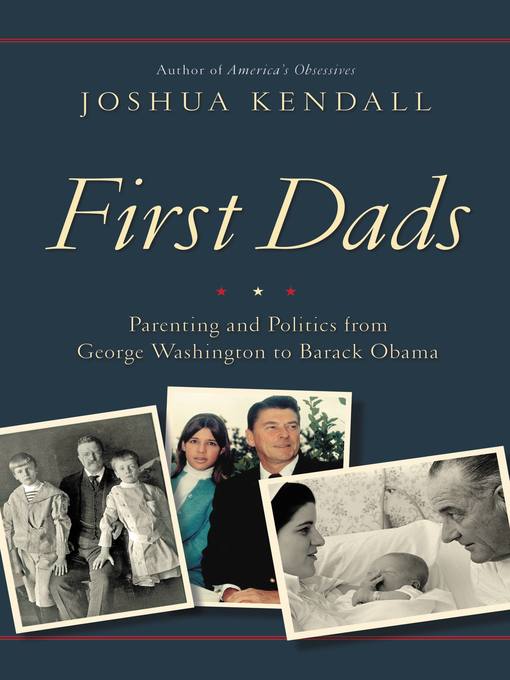
First Dads
Parenting and Politics from George Washington to Barack Obama
کتاب های مرتبط
- اطلاعات
- نقد و بررسی
- دیدگاه کاربران
نقد و بررسی

April 18, 2016
As biographer Kendall (The Forgotten Founding Father: Noah Webster’s Obsession and the Creation of an American Culture) argues, one can learn a great deal about American presidents by examining their parenting styles. To that end, Kendall highlights three distinct styles identified by child-development experts: authoritarian (Jimmy Carter, who put his family to work first in his peanut farming business and then in his political campaigns), authoritative (Barack Obama, who mandates family dinners five nights a week), and permissive (Ulysses S. Grant, who brought his children to visit him during the Civil War and rarely, if ever, offered a rebuke). Kendall doesn’t categorically endorse or condemn any of these, only noting that pros and cons exist for each. Perhaps most interesting is Kendall’s take on a side issue: How does dedication to parenting affect a political career? Can one have both? The book’s organization leaves something to be desired, interpolating brief histories of presidents and their families into the text seemingly at random, rather than chronologically or by parenting style. Nonetheless, this volume may give readers a better idea of what qualities to look for in their leaders.

March 15, 2016
A look at the parenting practices of American presidents. The United States has had 43 male presidents, men who were not only fathers to the nation, but also fathers to over 200 children. Of those 43, 38 presidents had biological children, and the remaining five men all raised adopted children. Kendall (America's Obsessives: The Compulsive Energy that Built a Nation, 2013, etc.) takes readers behind the scenes to reveal their private parenting techniques, using interviews, letters, and diaries to access a world that few have seen. The bond between these first fathers and first children has often been purposefully overlooked by biographers to protect the integrity of the first families. However, as the author writes, "the manner in which each President carried out his parental responsibilities reveals much about both his beliefs and aspirations as well as about his psychological makeup." Kendall categorizes the presidents into different types of fathers. There were those who were so involved with the job that they often ignored the children--e.g., Franklin Roosevelt, Jimmy Carter, and Lyndon B. Johnson--and those who loved to connect by being playful (Ulysses S. Grant and Theodore Roosevelt). Then there are the men who had extramarital affairs that produced offspring, such as John Tyler, who fathered several children out of wedlock. John Quincy Adams and others are known for being "tiger" dads who controlled the lives of their children as tightly as they did the nation. Franklin Pierce and George H.W. Bush are just two who suffered the devastating deaths of children. Rutherford B. Hayes, James Garfield, and Barack Obama are known as nurturers. Kendall's research puts all the presidents and their parenting practices in perspective, giving readers great insight into these men and their children. Rich in detail, this informative book gives new understanding to our nation's leaders and their offspring.
COPYRIGHT(2016) Kirkus Reviews, ALL RIGHTS RESERVED.

February 15, 2016
In this fascinating title, award-winning journalist Kendall gives a new flavor to the presidential biography with a look at fatherhood as experienced by the White House residents. Divided into chapters such as "Tiger Dads" and "The Grief Stricken," it groups presidents by parenting styles, giving new insight into their already rich lives. Jimmy Carter, for example, rarely spent time at home when his children were young and was an "autocratic head of household" who "held the expectation that those junior to me would honor my commands." In contrast, Gerald Ford falls under the nurturing category, while James Garfield supposedly delighted in jumping on the bed with his kids. VERDICT This inspiring title is likely to appeal to many different readers. History buffs, U.S. presidential scholars, and Dad on Father's Day will all relish this walk though time and the shared experience of parenting.
Copyright 2016 Library Journal, LLC Used with permission.

April 1, 2016
A president can rightfully be called the father of his country because his role is to lead and guide. In this fact-packed book, Kendall (America's Obsessives, 2013) examines the relationships between 18 presidents and their children. He divides the group into six categories (with three dads in each) based on parenting styles, and shares examples from their lives in and out of the White House. Interestingly, Kendall goes out of his way to include at least one lesser-known president in each group, skipping popular choices such as John F. Kennedy and Abraham Lincoln and opting, instead, for Jimmy Carter (preoccupied), Woodrow Wilson (playful), John Tyler (double-dealing), John Adams (tiger), Franklin Pierce (grief-stricken), and Rutherford Hays (nurturer). Kendall points out the similarities between governing and parenting styles and includes details on the fates of political offspring (which are more often than not dire). Keeping track of all children and grandchildren can be daunting, but the insights into the presidents' lives (not to mention the dollops of gossip) will hold readers' interest.(Reprinted with permission of Booklist, copyright 2016, American Library Association.)

























دیدگاه کاربران